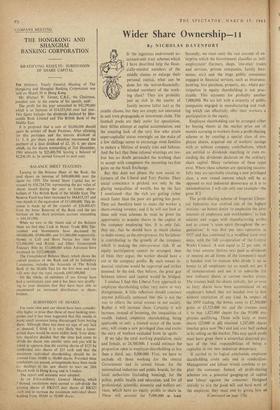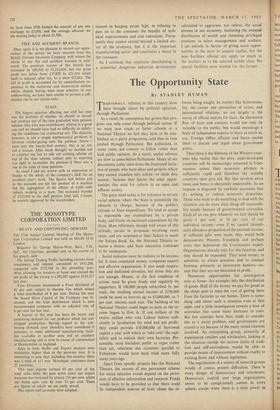Wider Share Ownership
By NICHOLAS DAVENPORT
IF the ingenious endowment as- surance-unit trust schemes which I have described help the finan- cially-minded members of the middle classes to enlarge their personal capital, what can be done for the not-so-financially- minded members of the work- ing class? They are probably
middle classes, but they are simply not interested in unit trust propaganda or investment clubs. The football pools are their outlet for speculation, their blithe attempt at capital accumulation, and the amazing luck of the very few who attain super-capitalist status overnight on the stake of a few shillings seems to encourage most families
to endure a lifetime of weekly tries and failures. And the fact that these colossal winnings are tax- free has no doubt persuaded the working class to accept with composure the mounting tax-free gains on the Stock Exchange.
But this does not please the new social re- formers of the Liberal and Tory Parties. Their social conscience is pricked, not only by the glaring inequalities of wealth, but by the fact I mentioned—that the rich are getting richer much faster than the poor arc getting less poor.
They are therefore keen to make the worker a share-owning investor, and if he will not look at these unit trust schemes he must be given the opportunity to acquire shares in the capital of the company employing him. It is only fair, they say, that he should have as much chance
to make money as the entrepreneur, for his labour is contributing to the growth of the compiny which is making the entrepreneur rich. If an
equity participation cannot be arranged, then at least, they argue, the worker should have a cut in the company profits. By such means in- dustrial relations would be improved and strikes lessened. In the end, they believe, the great gap between labour and capital would be bridged.
I confess I find this Liberal-Tory approach to employee shareholding either very naive or very disingenuous. A little reflection should convince anyone politically unbiased that this is not the way to relieve the social stresses in our society.
Rather it will increase them. Certainly it will increase, instead of lessening, the inequalities of wealth. Indeed, employee shareholding, being applicable to only a limited sector of the econ- omy, will create a new privileged class and excite the envy of workers excluded from its spoils.
If we take the total working population, male and female, as 24,500,000, I would estimate the proportion open to employee-shareholding as less than a third, say, 8,000,000. First, we have to
exclude all those working for the central Government and its armed forces, for the nationalised industries and public boards, for the local authorities (including housing), for the police, public health and education, and for all 'professional, scientific, domestic and welfare ser- vices, which have no equity profits to share in. These will account for 7,000.000 at least.
Secondly, we must omit the vast amount of en- terprise which the Government classifies as 'self- employment' (farmers, shops, 'one-man' trades and services, private companies, family busi- nesses, etc.) and the huge public companies engaged in financial services, such as insurance. banking, hire purchase, property, etc., where par- ticipation in equity shareholding is not prac- ticable. This accounts for probably another 7,000,000. We are left with a minority of public companies engaged in manufacturing and trad- ing which can effectively offer their workers a participation in the equity.
Employee shareholding can be arranged either
by buying shares at the market price out of monies accruing to workers from a profit-sharing scheme or by creating a special class of em- ployee shares, acquired out of workers' savings with or without company contributions, which arc entitled to dividends matching or even ex- ceeding the dividends declared on the ordinary share capital. Many variations of these types exist. Where these schemes are operating success- fully they are inevitably creating a new privileged class, a new vested interest which will be as opposed to real industrial democracy as it is to nationalisation. I will cite only one example--the great ICI.
The profit-sharing scheme of Imperial Chemi-
cal Industries was evolved out of the highest motives—an honest desire 'to emphasise the joint interests of employees and stockholders.' to link salaries and wages with manufacturing profits and so create 'a team spirit throughout the or- ganisation.' It was first put into operation in 1927 and has continued in a modified form ever since, with the full co-operation of the Central Works Council. A sum equal to 22 per cent. of the total amount (before tax) paid as dividends or interest on all forms of the company's stock is handed oVer to trustees who divide it up as bonus to all employees (at so much net per £ of remuneration) and use it to subscribe for new ordinary shares at current market prices. The trustees hold the shares initially. but as soon as forty shares have been accumulated on an employee's behalf they are handed over to him without restriction of any kind. In respect of the 1959 trading, the bonus came to 0,306.000 gross or £5,523,000 net and the trustees used it to buy 1,825,000 shares for the 93,000 em- ployees qualifying. Those with forty or more shares (23,000 in all) received 1,247,000. shares (market price now 70s.) and just over half cashed in by selling on the market. This easy quick profit must have given them a somewhat distorted pic- ture of the real responsibilities of being a capitalist in our new industrial democracy.
If carried to its logical conclusion, employee shareholding could only end in syndicalism. Management and labour would combine to ex- ploit the consumer. Indeed, all profit-sharing schemes are a potential ganging-up of capital and labour against the consumer. Designed initially to win the good will and hard work of the employee, they must end by giving hint an
(Continued on page 378)
we have since 1956 limited the amount of any one mortgage to £3,000, and the average advance we are making today is about £1,700.
FIRE AND ACCIDENT BRANCH.
Once again it is my pleasure to record our appre- ciation of the service we have received from the British General Insurance Company with whom the whole of our fire and accident business is rein- sured. The premium income of this branch has increased by £89,000 to £1,210,000, but our gross profit has fallen from £37,828 to £21,014 which itself is reduced, after tax, to a mere £12,661. The fall in profit is accounted for by unsatisfactory ex- perience in the motor-car and motor-cycle section where, despite having been more selective in our underwriting, we have been unable to prevent a sub- stantial rise in our claims ratio.
STAFF.
The biggest question affecting our staff last year was the problem of whether we should or should not contract out of the new graduated state pension scheme. Our oNsvn non-contributory scheme is a good one and we should have had no difficulty in satisfy- ing the conditions for contracting out. The decision, however, is not a simple mathematical problem; it involves crystal-gazing into the political future— even into the twenty-first century; this is an art, not a science. After much thought we decided not to contract out but to ride our existing scheme on top of the state scheme, subject only to reserving our right to reconsider the position if there was a rise in the rates of state pensions.
As usual .1 end my review with an expression of thanks to the whole of the .company's staff for an excellent year's work. The figures laid before you in the accounts are not the product of a machine but the aggregation of the efforts of 4,000 indi- viduals working as a team. The increased transfer of £330.000 to the staff pension fund will, I know, be warmly approved by the stockholders.
interest in keeping prices high, in refusing to pass on to the consumer the benefits of tech- nical improvements and cost reductions. Fortu- nately they cannot extend beyond a limited sec- tor of the economy, but it is the important manufacturing sector and constitutes a threat to the consumer.
So I conclude that employee shareholding is a somewhat dangerous industrial development calculated to aggravate, not relieve, the social stresses in our economy, increasing the unequal distribution of wealth and extending privileged positions to select managements and workers. I am entirely in favour of giving more oppor- tunities to the poor to acquire capital, but the new facilities offered can apply as much to the workers as to the salaried middle class. No special facilities seem needed for the former.







































 Previous page
Previous page